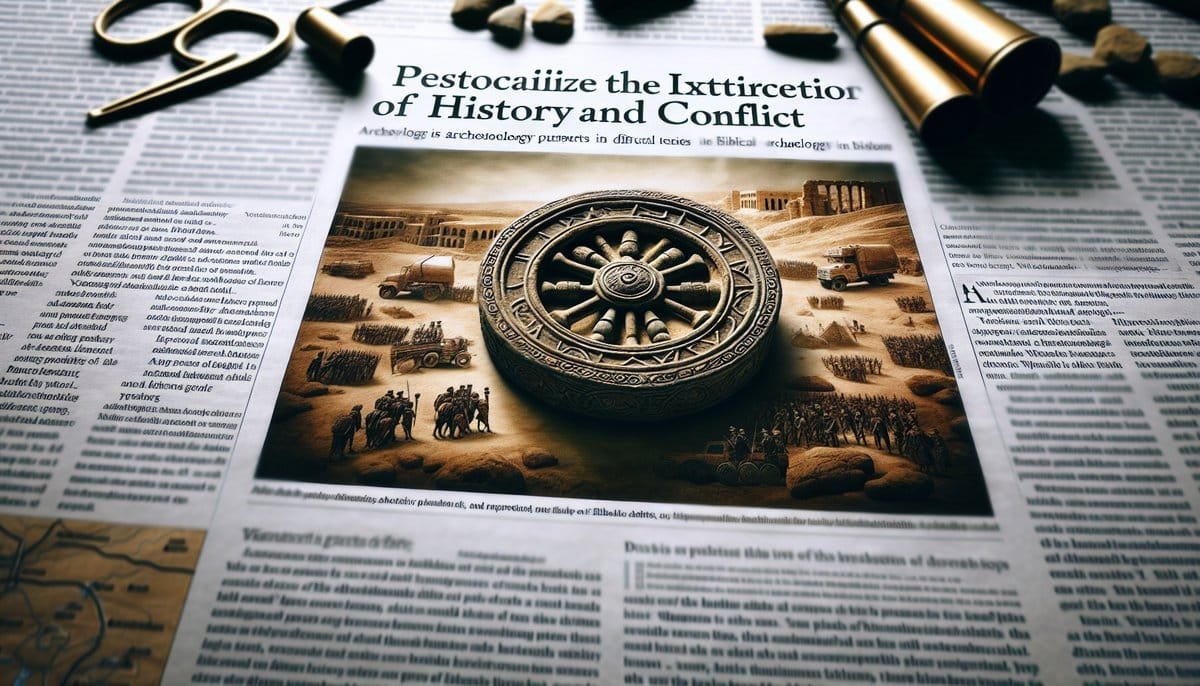In “Unearthing the Crossroads of War: Biblical Archaeology’s Encounter with Conflict,” the article explores the intriguing and intricate relationship between war and biblical archaeology. Delving into the impact of warfare and conflict on the field, the author uncovers how the tumultuous history of armed conflicts has shaped and influenced the study of biblical sites and artifacts. From the ruins of ancient battlegrounds to the discovery of hidden treasures amidst war-torn landscapes, this captivating exploration offers a unique perspective on the interconnectedness of war and the excavation of biblical archaeology.
Unearthing the Crossroads of War: Biblical Archaeology’s Encounter with Conflict
The Significance of Biblical Archaeology in the Context of War and Conflict
Biblical archaeology plays a vital role in understanding the impact of war and conflict in ancient times. This field of study allows us to uncover and explore the remains of ancient battles, military strategies, and the effects of warfare on cities and civilizations. By examining archaeological evidence alongside biblical narratives, we gain valuable insights into the historical events that shaped the ancient world. Moreover, biblical archaeology can provide a deeper understanding of the cultural and social implications of war, shedding light on the lives of the people who lived in these tumultuous times.
Exploring the Influence of Ancient Warfare on Biblical Events
Ancient warfare had a profound influence on the biblical events recorded in the Old Testament. By comparing archaeological findings with biblical accounts, we can gain a more accurate understanding of military campaigns and their impact on the development of ancient Israel. For instance, the conquests and invasions of neighboring nations had a significant influence on shaping the geopolitical landscape of the region and the emergence of Israel as a nation. Additionally, the Exodus, a pivotal event in biblical history, has been linked to ancient warfare, as many scholars suggest that the Israelites’ escape from Egypt was likely the result of a military conflict with the ruling power.

The Role of Archaeological Discoveries in Understanding War Strategies
Archaeological discoveries provide important insights into ancient war strategies and military fortifications. By analyzing defensive systems and military structures, such as walls, fortresses, and watchtowers, we can better understand the defensive tactics employed by ancient civilizations. Moreover, the unearthing of ancient weapons, armor, and military equipment offers valuable information about the weaponry and tactics used in battles. Such discoveries enable us to reconstruct the strategies employed by ancient armies and gain a deeper appreciation for the sophistication of their warfare methods.
Wars That Shaped Ancient Israel: Insights from Archaeology
Several wars and conflicts throughout history had a profound impact on shaping ancient Israel. By studying archaeological evidence, we can gain insights into these pivotal moments in biblical history. The Philistine wars, for example, were crucial in defining the relationship between the Philistines and the Israelites, as well as shaping the political and military landscape of the region. Likewise, the Assyrian invasion and the subsequent fall of the northern kingdom of Israel dramatically changed the course of ancient Israelite history. The Babylonian exile and the destruction of Jerusalem further highlight the devastating consequences of war. The Maccabean revolt, on the other hand, serves as a testament to the fight for Jewish independence and the struggle against foreign oppression.

Uncovering the Battlefield: Archaeological Evidence of Ancient Warfare
Archaeologists are continually unearthing ancient battlefield sites, providing valuable insights into the realities of ancient warfare. The methodologies employed in excavating these sites vary depending on the location, time period, and available resources. Excavations at battlefield sites involve the recovery of weapons, armor, and military equipment, which not only shed light on the weapons and strategies used in battle but also provide clues about the identities and composition of the armies involved. Furthermore, the examination of burial practices and memorials of fallen warriors allows us to gain a deeper understanding of the human toll of war and the cultural significance attached to honoring the fallen.
Conflict in the Promised Land: Archaeological Perspectives
The land of Canaan, often referred to as the Promised Land in biblical narratives, was a hotbed of conflict in ancient times. Archaeological evidence provides valuable insights into the conflicts between the Canaanites and the Israelites. Excavations have uncovered evidence of fortified cities and military architecture, suggesting armed conflicts and tensions in the region. Jerusalem, in particular, played a significant role in ancient warfare, serving as a crucial strategic location and a target for conquest. The Battle of Jericho, as described in the Book of Joshua, has been of particular interest to archaeologists, who have sought to uncover evidence of the walls and destruction associated with the biblical account.
The Impact of War and Conflict on Ancient Cities
War and conflict had a profound impact on ancient cities, often leading to their destruction and reconstruction. Excavations of ancient city sites provide archaeologists with valuable insights into the effects of warfare on urban centers. By studying the layers of destruction and reconstruction, archaeologists can trace the patterns of conflict and understand how cities coped with the aftermath of war. Additionally, the study of urban warfare in ancient times helps us appreciate the strategies employed by opposing forces, such as sieges, raids, and conquests. The political and social transformations resulting from these conflicts provide further avenues of exploration for biblical archaeologists.
Biblical Archaeology and the Search for Evidence of Battlefields
One of the primary goals of biblical archaeology is to identify and investigate potential battle sites in the ancient Near East. Archaeologists rely on a combination of textual and archaeological clues to pinpoint locations where significant battles may have taken place. The use of remote sensing and geophysical methods has also proven invaluable in locating ancient battlefields. By conducting systematic surveys and excavations, archaeologists can map out the ancient landscape of war and gain a better understanding of the conflicts that shaped biblical narratives. Case studies of famous battlefields, such as the investigation of the site associated with David and Goliath, provide concrete examples of how archaeological investigations can shed light on specific biblical events.
The Ethics and Challenges of Conducting Archaeological Excavations in War Zones
Conducting archaeological excavations in war zones presents numerous ethical and practical challenges. The dangers and risks associated with working in conflict areas are significant, ranging from personal safety to the potential destruction of cultural heritage. Archaeologists must navigate these challenges while still ensuring the protection and preservation of valuable archaeological sites and artifacts. Collaboration between archaeologists and military forces is sometimes necessary to ensure the safety of excavation teams and the preservation of cultural heritage. Ethical considerations also come into play in the study and display of war-related artifacts, as sensitivity to the cultural and emotional implications of such objects is crucial.
Conclusion: The Intersection of War, Conflict, and Biblical Archaeology
Biblical archaeology’s encounter with war and conflict uncovers a wealth of knowledge about ancient battles, military strategies, and the impacts of warfare on civilizations. By examining archaeological evidence alongside biblical narratives, scholars gain a deeper understanding of the historical events that shaped the ancient world. The influence of ancient warfare on biblical events becomes clearer, offering insights into military campaigns and the development of ancient Israel. Archaeological discoveries provide key insights into war strategies, such as defensive systems and military fortifications. Moreover, the excavation of ancient battlefield sites reveals artifacts and burial practices that shed light on ancient warfare and its effects. The conflict-ridden land of Canaan and the impact of war on ancient cities further deepen our understanding. The search for evidence of battlefields through biblical archaeology is an ongoing endeavor, with remote sensing and geophysical methods playing a crucial role. However, conducting excavations in war zones presents its own set of ethical challenges and practical risks. Despite these challenges, biblical archaeology continues to thrive and contribute to our understanding of the intersection of war, conflict, and ancient civilizations.






